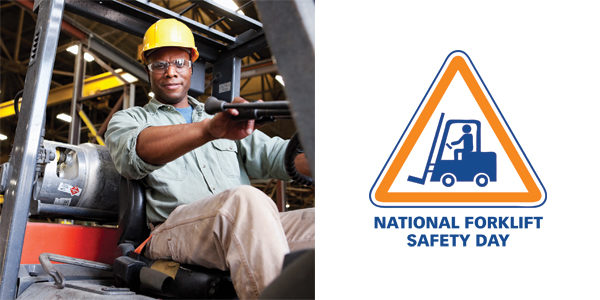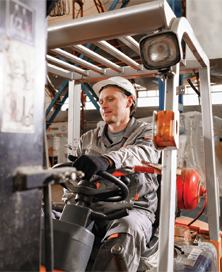10 tips to maximize safety—and productivity—when operating with propane forklifts

Propane forklifts offer reliable performance, increased productivity, versatility, and lower emissions for a variety of material handling operations, which is why they're often called upon to work around the clock to keep businesses on schedule.
 For all their benefits, though, forklifts and other powered industrial trucks bring with them various potential hazards that can endanger both pedestrians and operators. Forklifts need to be operated safely in order to prevent time-loss accidents.
For all their benefits, though, forklifts and other powered industrial trucks bring with them various potential hazards that can endanger both pedestrians and operators. Forklifts need to be operated safely in order to prevent time-loss accidents.
By following forklift safety procedures while behind the wheel, operators can protect themselves and co-workers. Safe operation of propane-powered forklifts also goes hand in hand with greater productivity.
Maximize safety by reinforcing these 10 simple steps:
1. Buckle up. Overturned forklifts are a leading cause of forklift-related accidents and fatalities. Buckling up while a sitdown forklift is in use can save operators from getting crushed by the machine's overhead guard or roll cage.
2. Inspect propane cylinders prior to operation. Thoroughly inspect the forklift's propane cylinders after removal from a storage cage to ensure they're in good condition. Check cylinders for rust, dents, and gouges. Use your senses of smell, hearing, and sight to check for leaks in the cylinder. Cylinders that show signs of wear or leaks should not be used and may need to be replaced even if within the cylinder's requalification date.
3. Stop the forklift before raising or lowering the forks. Ensuring the forklift is stopped before moving the forks can greatly reduce the risk of tipping the machine or dropping the load.
4. Set the parking brake, lower the forks, and set controls to neutral when finished. Safely parked forklifts reduce the danger of unintended movement when a forklift is left unattended. If a forklift is parked on an incline, the machine can be further secured with wheel blocks.
5. Store propane cylinders in a secure rack or cage. A propane cylinder storage rack or cage should be located away from exits, stairways, entryways, or high-traffic areas. Forklift cylinders can be stored horizontally with the pressure-relief valves in the uppermost position. Operators should use proper lifting techniques when removing cylinders from storage and placing them onto a forklift.
6. Close service valves on propane cylinders when not in use. This helps prevent unintended fuel loss and potential injury around internal-combustion engines.
7. Keep loads within the weight capacity of the forklift. Overloading a forklift can greatly increase the risk of tipping the machine by unbalancing the forklift's center of gravity.
8. Use caution on grades or ramps. Operators should use slow speeds for both ascending and descending, and avoid lifting pallets or loads higher than is needed to clear the road surface. For grades greater than 10 percent, forklifts both ascending and descending should be driven with the load upgrade. Forks should be pointed downgrade when there is no load regardless of the direction of travel.
9. Ensure the pressure-relief valve on the propane cylinder is secure and points away from the locating pin. Check that the pressure-relief valve fitting is approximately 180 degrees from the forklift's locating pin.
10. Slow down and sound the horn at locations where vision is obstructed. Forklift operators should always look in the direction of travel and should travel in reverse if loads are large enough to obscure their view. Warehouse managers can have spotters located at corners to reduce the risk of collisions with people and other forklifts. Concave mirrors can also be used to aid in visibility around corners or at aisles. Always consider the noise level as well, as pedestrians or other operators may not be able to hear a horn.
Don't let safety measures take a back seat to meeting the needs of a busy warehouse or distribution center. Keeping safety top of mind for operators and managers can be key in keeping business moving forward.
But the good news is that facilities using propane forklifts have a safety resource already at their fingertips in their propane supplier, who can help ensure safety across a facility's forklift fleet and refueling setup throughout the life of the equipment or whenever questions arise.
Find out more about the benefits of propane-powered forklifts.
Related Articles

Jeremy Wishart is director of off-road business development for the Propane Education & Research Council. He can be reached at jeremy.wishart@propane.com.
Copyright ©2024. All Rights ReservedDesign, CMS, Hosting & Web Development :: ePublishing